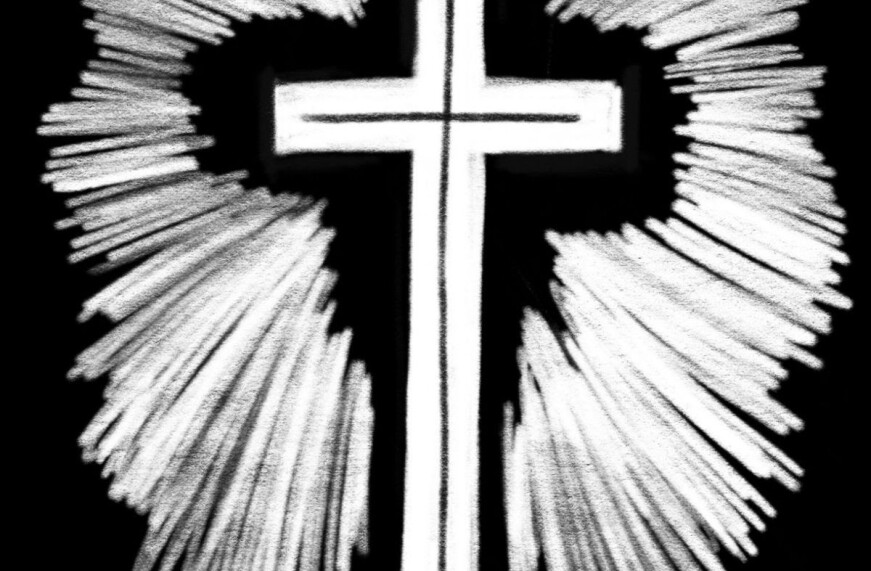You can listen to the reading and reflection by clicking here.
Psalm 22.1-18
My God, my God, why have you forsaken me? *
and are so far from my cry
and from the words of my distress?
O my God, I cry in the daytime, but you do not answer; *
by night as well, but I find no rest.
Yet you are the Holy One, *
enthroned upon the praises of Israel.
Our forefathers put their trust in you; *
they trusted, and you delivered them.
They cried out to you and were delivered; *
they trusted in you and were not put to shame.
But as for me, I am a worm and no man, *
scorned by all and despised by the people.
All who see me laugh me to scorn; *
they curl their lips and wag their heads, saying,
"He trusted in the Lord; let him deliver him; *
let him rescue him, if he delights in him."
Yet you are he who took me out of the womb, *
and kept me safe upon my mother's breast.
I have been entrusted to you ever since I was born; *
you were my God when I was still in my
mother's womb.
Be not far from me, for trouble is near, *
and there is none to help.
Many young bulls encircle me; *
strong bulls of Bashan surround me.
They open wide their jaws at me, *
like a ravening and a roaring lion.
I am poured out like water;
all my bones are out of joint; *
my heart within my breast is melting wax.
My mouth is dried out like a pot-sherd;
my tongue sticks to the roof of my mouth; *
and you have laid me in the dust of the grave.
Packs of dogs close me in,
and gangs of evildoers circle around me; *
they pierce my hands and my feet;
I can count all my bones.
They stare and gloat over me; *
they divide my garments among them;
they cast lots for my clothing.
Be not far away, O Lord; *
you are my strength; hasten to help me.
Psalm 22 begins with the cry: “My God, my God, why have you forsaken me?” This cry of utter despair and abandonment is echoed by Jesus on the Cross. This cry cuts me to the core—if even God has abandoned me, what possible hope is there? Here we are, on Good Friday morning and, to me, this psalm vividly tells the story of Good Friday. Here we plumb the depths of human desolation as we walk with Jesus to his death on the cross.
I have always been struck by the extreme language of this psalm--“as for me, I am a worm and no man”, “all who see me laugh me to scorn”, “I am poured out like water”, “my mouth is dried out like a pot-sherd” (my favorite), “Packs of dogs close me in” and many more. I used to think these verses were too extreme, they certainly didn’t apply to me personally!
But, as I think about it more, I think, yes, the psalm is extreme yet isn’t human life often extreme? This is the gift the psalms give us—all the range of human experience and emotion in all its beauty and horror.
Like others, I may have the illusion that I am protected from these extremes, but I don’t know what is to come. Of course, I have not been immune to suffering, loss and feelings of estrangement. Psalm 22 runs the gamut.
What I find encouraging is that such a despairing psalm keeps going back to the goodness of God. Even at the beginning the psalmist recalls that their ancestors had put their trust in God and were redeemed by God. The psalmist acknowledges God’s care from birth. This is a reminder that God has cared for me all my life, even when I was totally unaware of God’s presence. Or the times when I felt abandoned and alone, even abandoned by God.
For this year of pandemic, I am thinking of last March, when suddenly our lives were constricted, almost everything shut down and we were confined to our homes. We were surrounded by the threat of the coronavirus. I think of the verse “Packs of dogs close me in, and gangs of evildoers circle around me.” The psalmist prays: “Be not far from me, for trouble is near, and there is none to help.”
Late in March both Martin and I came down with Covid. For ten days I ran a temperature. Meanwhile, the quiet was disturbed by the wails of sirens from the ambulances rushing to the hospitals near us.
Several times the ambulance did not go rushing by, but stopped in front of our house and went into the home of our next-door neighbors. Martin witnessed our neighbor Eda being carried out the house by EMS workers. Later, we learned that her husband Roy had died of Covid.
We were lucky; we both recovered. We got through it. Yet, in thinking back, I seemed to be operating on automatic pilot; my fear had shut me down. So this is what the psalm means to me now. The cry: “My God, my God, why have you forsaken me?”—it doesn’t mean that God has actually forsaken me, I know that God will never forsake me. Instead, it is the human feeling of being forsaken by God (and by everyone else). It is I, in my fear and aloneness, who has forsaken God. I have shut off the connection, just when I most need the comfort of God’s presence. Over and over, us humans retreat into ourselves in time of trouble. Over and over, we must teach ourselves to be brave and open ourselves to the love that God provides.
This is the journey of the Cross.

